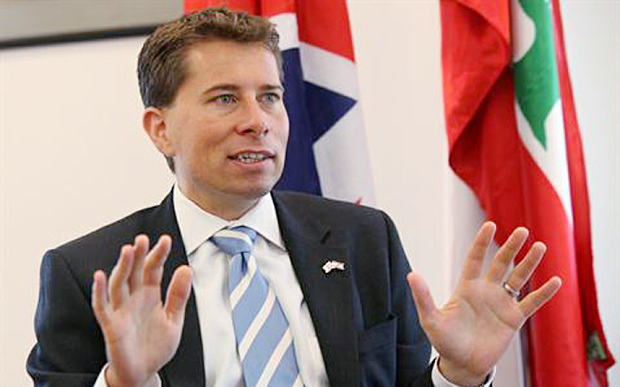Guns, greed and God. Game of Thrones with RPGs. Human rights and hummus rights," writes Tom Fletcher, Her Majesty’s Ambassador to Lebanon, in final blog entry

As farewell notes go, it reads more like the work of a swashbuckling war correspondent than a communique from Her Majesty’s diplomatic corps. There are diatribes against corrupt politicians and warlords, encounters with divas and rappers, and even a gleeful tale of being offered a buttock implant.
Yet it comes not from the pen of some modern-day Hemingway but Tom Fletcher, Her Majesty’s Ambassador to Lebanon, whose colourful valedictory notice after a four-year posting has broken with centuries of HMG tradition. Not just because of its impassioned, unstuffy prose- but because people outside of the dusty corridors of the Foreign Office have bothered to read it.
In contrast to the vast majority of articles written by serving ambassadors, most of which are studies in inoffensive blandness, Mr Fletcher’s punchy recollections on his time have proved a huge hit in Lebanon since he published them last week.
His praise of the country for taking in refugees from neighbouring Syria, and for not succumbing to the war engulfing the wider region, has seen his piece go viral on the Internet, with some Lebanese even suggesting he should lead the country.
"Tom’s words are inspirational and real. I would question if a Lebanese person could speak of the country and its potential like this," said one comment on his blog. Another added: "I would have campaigned for you to become a president ‘cos you love this country."
Oxford-educated Mr Fletcher, a rising star in the Foreign Office who has acted as a policy adviser to David Cameron, arrived in Lebanon in autumn 2011, just as the Arab Spring was igniting the deadly conflict in neighbouring Syria.
As well as helping the British government make sense of it all, his job has been to encourage peace and implement a UK-run training programme for the Lebanese army.
Or, as his distinctly non-mandarin style puts it: "Warlords and wasta (corruption). Machiavellis and mafia. Guns, greed and God. Game of Thrones with RPGs. Human rights and hummus rights … Your politics are also daunting, for ambassadors as well as Lebanese citizens. When we think we’ve hit bottom, we hear a faint knocking sound below."
Despite what must have often been a thankless task, given that the war in Syria has done nothing but escalate since his arrival, Mr Fletcher appears to have taken to his posting with gusto.
On top of his daytime job, he has become a favourite on the diplomatic social circuit, taken part in several running marathons, and met with many of liberal Beirut’s pop stars and artists.
He jokingly summarises it as "Four marathons, 100 blogs, 10,000 tweets, 59 calls on Prime Ministers, 600+ long dinners, and 52 graduation speeches". Commenting on the Lebanese fondness for plastic surgery – breast and buttock implants are especially popular – he wryly notes: "I was even offered a free buttock lift, but its value exceeded our £140 gift limit, so that daunting task is left undone."
• War is a million miles away when the Lebanese begin to party
Humour aside, Mr Fletcher also makes some candid observations on the Lebanese people he came to know and love. Without naming names, he blasts the country’s wealthy businessmen-power brokers, who he says undermine peace efforts and then lay the blame on other countries, be it Iran, Saudi Arabia, Israel or Britain. Many, he adds, have also had the cheek to ask the British embassy to fast track visas for cousins and friends when visiting the UK.
Overall, though, he is generous in his praise for the Lebanese, who, after going through full-scale civil war themselves in the 1980s, have not succumbed again despite being home to Sunnis, Shias, and Christians.
"When the Middle East was in flames, and its people caught between tyrants and terrorists, the Lebanon I will remember sent its soldiers to protect the borders; confronted daily frustrations to build businesses and to educate its children; and showed extraordinary generosity to outsiders, be they ambassadors or refugees," he writes.
He adds: "The real dividing line is not between Christianity and Islam, Sunni and Shia, East and West. It is between people who believe in coexistence, and those who don’t."
Whether Mr Fletcher’s piece has gone down as well in Whitehall as it has in Lebanon is not known. However, in writing a regular blog, he followed Foreign Office guidance in recent years that has encouraged ambassadors to abandon their traditional aloofness and engage more with the Internet and Twitter.
Not all such attempts have succeeded, either proving tediously anodyne, or inadvertently causing offence. The previous ambassador to Lebanon, Frances Guy, was denounced by Israel in 2010 after writing a blog that described a senior leader in the Hizbollah militia movement as a "decent" man.
Her successor has had rather better luck, with his blog on diplomacy and Middle Eastern affairs becoming required reading among foreign policy analysts. Especially popular was a tongue-in-cheek guide last year to the art of networking at business functions. Tips included: “Don’t thrust your business card at people until you think they might actually keep it,” and “Never get caught looking over people’s shoulders for more productive targets.”
His Twitter account has more than 40,000 followers, and as he proudly mentions in his valediction, has been used to conduct "online scraps with terrorists" and even "the first RT of a Western diplomat by the President of Iran."
Mr Fletcher, who is married with two children, is now taking a sabbatical, lecturing for New York University at its Middle East campus in Abu Dhabi. Judging by the warm welcome that his parting act of candour has received, he may have much to teach his students about the modern diplomat’s art.



